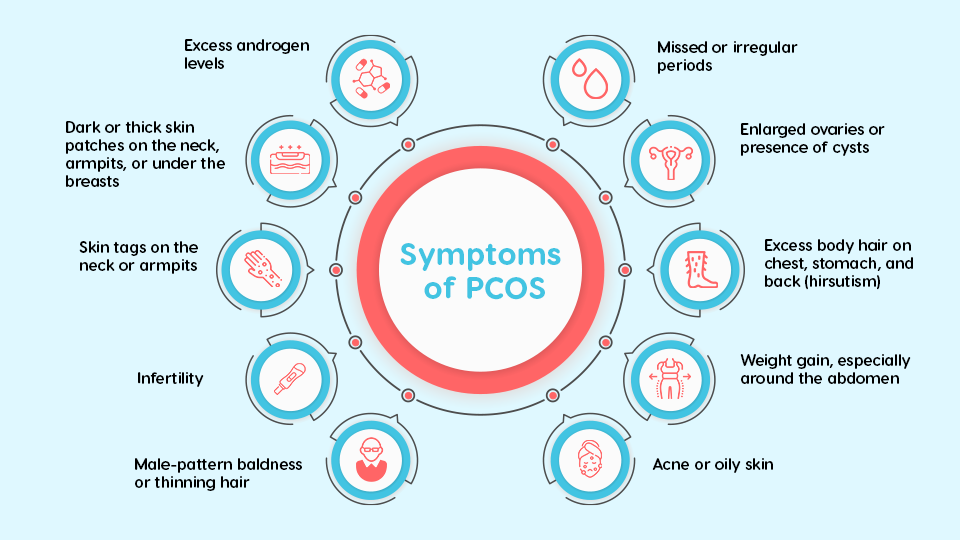
What is PCOS?
In 1935, Stein and Leventhal first described this condition in modern medical literature, documenting seven female patients who experienced amenorrhea, hirsutism (excessive hair growth), and enlarged ovaries with multiple cysts.
Today, PCOS is recognized as a common, diverse, and heritable disorder that affects women throughout their lives.
Women with PCOS are at a slightly higher risk of various metabolic and reproductive health consequences, including miscarriage, hypertensive disorders, gestational diabetes, cardiovascular disease, preeclampsia, prediabetes, type 2 diabetes, stroke, chronic kidney disease, breast cancer, endometrial cancer, and renal failure.
PCOS is characterized by ovulatory dysfunction, hyperandrogenism (excess androgens), and polycystic ovaries. However, there can be significant variations in how the condition presents in individuals.
It is commonly associated with abnormal menstruation, excess androgens, anovulation (lack of ovulation ), and subfertility.
PCOS can also present with acne, hair loss (alopecia), abnormal hair growth, and male-pattern baldness.
Diagnosis often shows the presence of insulin resistance and hyperinsulinemia, which indicates a higher risk of developing diabetes and cardiovascular disease.
Consequently, PCOS has a substantial impact on endocrine, metabolic, and cardiovascular health.
In recent years, there has been increasing consensus regarding the criteria needed to establish the diagnosis of PCOS. A routine clinical assessment is necessary if two out of the three features below are observed:
● Anovulation or oligo-ovulation
● Presence of polycystic ovaries on pelvic ultrasonography
● Clinical and/or biochemical signs of hyperandrogenism
While awareness of PCOS and its cause, diagnosis, and associated morbidity is increasing, its basic pathophysiology still remains poorly understood.
Therefore, we present a framework to teach and increase your understanding based on the causes, symptoms, and risk factors of PCOS through this article.

Symptoms of PCOS may include:
● Missed or irregular periods
● Enlarged ovaries or presence of cysts
● Excess body hair on chest, stomach, and back (hirsutism)
● Weight gain, especially around the abdomen
● Acne or oily skin
● Male-pattern baldness or thinning hair
● Skin tags on the neck or armpits
● Dark or thick skin patches on the neck, armpits, or under the breasts
● Excess androgen levels
If you experience any of these symptoms of PCOS, difficulty getting pregnant, or signs of excess androgen, it's important to visit your healthcare consultant.
Causes & Risk Factors:
The major causes of PCOS are still unclear. Many women with PCOS show insulin resistance, which means their bodies are unable to use insulin properly, leading to higher androgen levels.Insulin resistance may manifest as dark, velvety patches of skin, especially on the lower part of the neck, armpits, groin, or under the breasts. Obesity and weight gain exacerbate insulin levels and worsen PCOS symptoms.
Research suggests that certain genes may be linked to PCOS and can be inherited within families. Having a family history of PCOS increases the risk of developing the disorder.
PCOS patients often experience long-term, low-grade inflammation, which can lead to the production of androgens by polycystic ovaries and further contribute to heart and blood vessel-related problems.
Risk factors for PCOS include genetic predisposition, unhealthy behaviors resulting in overweight or obesity, hyperinsulinemia, insulin resistance, and hyperandrogenism.
Diets high in sugar, trans fat, fructose, animal fat, and processed foods can contribute to PCOS. Making adjustments to a healthy diet with natural nutrients or low glycemic index foods is recommended to promote metabolic health and prevent insulin resistance, obesity, and PCOS pathogenesis.
Regular exercise is also beneficial in improving insulin sensitivity, aiding in PCOS weight loss, and managing PCOS symptoms.
Diagnosis:
It is important to promote polycystic ovary syndrome treatments and increase metabolic health literacy and proactive health education, particularly among women and their family members, to raise awareness and encourage early detection of PCOS symptoms.
PCOS can be diagnosed through ultrasound or blood tests conducted by a healthcare consultant, considering your medical history and symptoms. While there is no proven way to prevent PCOS, taking small steps such as exercising regularly, eating nutritious foods, and maintaining a healthy weight can help minimize symptoms.
Adopting lifestyle changes and receiving medical treatments will help manage the symptoms, reduce the risk of additional health conditions, and improve your overall well-being.

